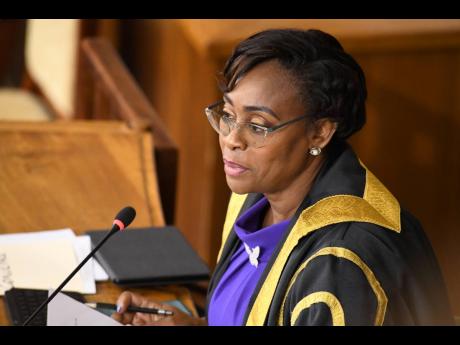Editorial | Clarify stance on AuG reports
When the House of Representatives sits today, the Speaker, Juliet Holness, must, before any other business, do two things.
She must confirm, or reject, that last week, she returned two audit reports to the auditor general, Pamela Monroe Ellis, and if she did, give to Parliament and Jamaica the basis upon which she acted, including how that decision may have been informed by her reading of the Constitution and the obligations of the auditor general (AuG) therein.
Anything short of this will only reinforce the perception among critics of the Speaker exercising her powers in a fashion that shields the Government from scrutiny under the guise of tacking closely to the rules.
These concerns emerged late last year with Ms Holness’ implementation of a controversial regime for the tabling of reports sent to Parliament by the AuG and the Integrity Commission (IC) and her refusal to make public a legal opinion by the island’s attorney general on the issue.
It was a long-standing practice that reports from the AuG and the IC were tabled in Parliament without delay, thereby immediately making them public documents. But last year, Ms Holness’ predecessor, Marisa Dalrymple-Philibert, ruled that in the future, reports by the auditor general, in keeping with the law, would be held for two months, allowing the appropriate ministers time to comment on them. If the minister did not do so within the prescribed time, the reports could be sent to Parliament for tabling.
The second plank of Ms Dalrymple-Philibert’s regime was that reports by the IC would first be sent to Parliament’s Integrity Commission Oversight Committee (ICOC) for review before being tabled.
In the face of widespread protests, including from opposition legislators, Ms Dalrymple-Philibert requested an interpretation of the Financial Administration and Account Act (FAAA) on the question of handling AuG reports and the Integrity Commission Act, with respect to reports from that agency.
DECLINE TO PUBLISH
The Speaker declined to publish those opinions. While apparently holding to her initial stance, Ms Dalrymple-Philibert had not made a final determination by the time she was forced to resign after being criticised and threatened with criminal prosecution by the IC over how she used a duty-tax concession to public officials on motor vehicles.
Ms Holness, too, has not released the attorney general’s opinion – which appears to have argued that there were no restrictions on tabling reports from the Integrity Commission, while the consideration for those by the AuG depended on under what section of the FAAA they were submitted. However, she released opinions by the Parliamentary Counsel that gave support to her ruling:
• That the two-month delay for reports by the AuG would remain in place;
• Investigative reports by the IC, as well as any directly commissioned by Parliament, would be tabled as soon as possible after their receipt but after review by the parliamentary officials, presumably the Speaker and the clerk;
• Other IC reports, including its annual reports or special reports done at the commission’s own initiative, would first be sent to the oversight committee.
It emerged on Friday that two reports from the auditor general, sent to Parliament separately on December 28 last year and on January 29, were returned to the auditor general 84 and 54 days, respectively, after their receipt by Parliament. This disclosure was made after a statement by the general secretary of the governing Jamaica Labour Party that there were no untabled reports from the IC or the auditor general with the Speaker.
The Speaker’s position, apparently, is that in sending her reports to Parliament several weeks ago, Ms Monroe Ellis breached the requirements of the FAAA and the Public Bodies Management and Accountability Act and her related rulings.
Notwithstanding that these reports have been around for months, with public officials having had an opportunity to pore over them, the argument, it would seem, is that the AuG ought not to have sent the documents to Parliament ahead of having ministers comment on them. This would now have to happen before they are remitted to the legislature.
LARGER QUESTION
A larger question, it seems, to this newspaper, is of the constitutional obligations of the AuG to send reports to Parliament and the vehicle via which this is done.
The auditor general is a creature of the Constitution, with the job of conducting audits of, among other things, “all departments and offices of the Government of Jamaica (including the offices of the Cabinet, the Judicial Service Commission, the Public Service Commission and the Police Service Commission)”.
Section 122 (2) of the Constitution says: “The Auditor-General shall submit his reports made under subsection (1) of this section to the Speaker (or, if the office of Speaker is vacant or the Speaker is for any reason unable to perform the functions of his office, to the Deputy Speaker) who shall cause them to be laid before the House of Representatives.”
Perhaps there are other interpretations of the job of the auditor general not captured in the quoted section of the Constitution on which Speaker Holness has advice. In that event, she should share that advice, in its totality, with Parliament.
If Ms Monroe Ellis has returned her reports to Ms Holness, as it was reported that she intended to do, it is possible that she has advice consistent with most people’s reading of Section 122 (2).

